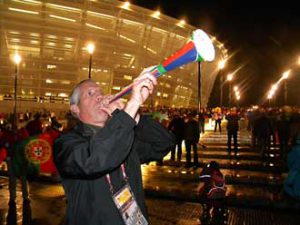
By Bob Babinski
Rare has been the day where somebody, somewhere in the world hasn’t complained about South Africa’s vuvuzelas. Too bad, really. I happen to think they’re fun and give expression to the people of this country. Yet, the international buzz of complaint from party-poopers is even louder – party-poopers who are usually quick to call down anything unfamiliar, or not part of their “tradition.”
I acknowledge that the sound of the approaching army of hornets takes some getting used to – but after a couple of matches, our brains adjust.
I believe the vuvuzela is important because it gives the South Africa World Cup a signature. If we didn’t have that signature, there’d be few reminders during the soccer action that this event is taking place in South Africa.
And this World Cup is about more than just the competition, it’s about South Africa and the African continent – hosting this prestigious event for the first time.
What a major step forward it is for the rest of the world to come to this continent to celebrate the beautiful game. The African pride of hosting the world is unmistakable. It’s an incredibly validating experience, and I see it in the eyes of just about every African I meet here. Too many times to count, people ask me “so, what do you think of South Africa?” And they beam when I tell them how positively I’m reacting.
Not long ago, the thought of this happening in South Africa was unimaginable. When I was a student at McGill in the early 80’s, protests against the South African apartheid regime were common. Back then, it seemed that economic sanctions couldn’t possibly be enough, and that the unjust and cruel regime would never change. Here we are, only 20 years after the end of the apartheid regime, and despite the many troubles that dog this nation, it is able to host an enterprise on this scale.
There is still hope that this can be what Mandela called a “rainbow” nation, and that positive change is still to come. Already, many people here are talking about how soccer is helping to ease some of the long-standing barriers that exist between ethnic groups. Many will tell you, however, that they are having trouble changing the international perception that this is simply a crime-ridden cesspool, and nothing more.
Archbishop Desmond Tutu has been much more articulate than I in his defense of the vuvuzela, encouraging foreigners to enjoy everything that is African, and egging the locals to blow even louder. He says Africans need to celebrate their heritage, and the vuvuzela is part of it.
The origin of the vuvuzela lies with the Nazareth Baptist Church, known as Shembe. They’ve used a horn called the Imbomu for the last 50 years, and they use it as part of their cycle of praise and worship. It took on a different purpose when some young people from the church started bringing them to soccer matches in the 90’s. Not the sacred use elders hoped for, but such is the fate of objects when a different kind of imagination takes hold of them.
By the early 2000’s, the vuvuzela was commercialized, and now a company named Masincedane Sport owns the trademark. The company says 1.5 million horns were sold in Europe since last October.
It’s worth noting that at airports, restaurants, and at the stadiums, it seems the visitors to this country are having as much fun blowing the vuvuzelas as anyone else.
I’ve been here for a little more than three weeks now, and my every move seems to have been accompanied by the whir of the horn. It wakes me up at 7 in the morning, it chases me when I go for a jog, it blares from cars when our team sits at sidewalk cafes, and of course, it inhabits us when we watch the matches from inside the stadiums. This is all good… the sound of a nation reaching out to me.
Bob Babinski (BA’86) is Chair of the McGill News Advisory Board. He is in South Africa as a producer for CBC’s World Cup coverage. This article originally appeared on Babinski’s blog at http://good4sports.wordpress.com/
